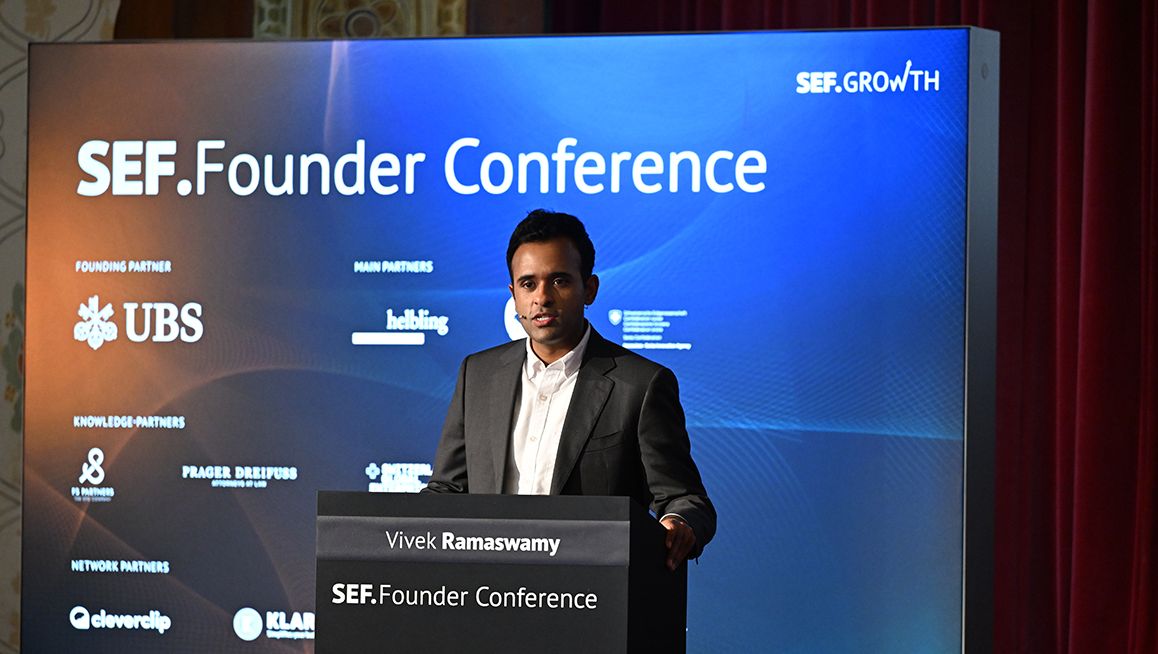
Following the success of biotech company Roivant Sciences, which received FDA approval for several drugs and had a spectacular IPO, Vivek Ramaswamy has now started an investment company with which he wants to take on the industry giants. In the margins of the Swiss Economic Forum we spoke to him about big ambitions, independent thinking in start-ups and corporate responsibility in the face of the threat of social division.
Mr Ramaswamy, with its office in Basel, Roivant is well known in Switzerland. You yourself described Roivant as a new type of biotech company. What exactly was new about it?
We ensured that the interests of researchers and developers were more closely aligned with those of the company. Normally, they share the risks – if a project fails, they can lose their job – but they are not involved in the upside. At Roivant, this is different. In addition, the company licenses specific projects through its subsidiaries that are not pursued by elsewhere; for example, because they do not fit the portfolio.
What has been Roivant’s biggest success?
FDA approval of several drugs.
Have any other biotech companies copied your approach of aligning the interests of researchers and developers with the company?
Some have, and that’s a good thing. We have changed the industry for the better.
In January 2021, you resigned as CEO of Roivant. Why?
I had been making notes for my book before then and I wanted to focus on that. Also, I didn’t want to publish the book as Roivant’s CEO, but as an independent thinker and writer.
You write in the book that you fear if companies engage in politics and promote ESG issues, it will lead to societal divisiveness. Can you explain this?
The classic argument against corporate engagement is that it impairs economic performance. My argument is different. When big companies become involved, they exercise political functions for which they are not qualified. Divisiveness occurs because not everyone is behind ESG issues. Specifically, one can already see in the US that companies have emerged that address precisely this target group; for example, there is a kind of Starbucks for Republicans. I think it’s dangerous if there’s no place or opportunity for everyone to connect, and all life happens in either the Republican or Democratic ecosystem.
You are an entrepreneur. So you have gone on from the book and founded a new company, Strive, based on these thoughts. What does Strive do?
While researching the book, I realised that the big three in wealth management in the US – Blackrock, Vanguard and State Street – are very influential. They manage more than USD 22 trillion and all three push the companies in which they invest in a certain political direction without any authority to do so. Strive wants to offer an alternative to this. The investment company will not require the companies in which it invests to pursue political goals, but to focus on product excellence.
Strive will launch its first product shortly. The market test is still pending, but the recruitment process must have already shown you whether your concept will be well received. How has recruitment gone so far?
Very good, and better than in my other ventures. Many employees inside and outside the financial industry appear to prefer to work in a politically neutral company such as Strive than in companies dedicated to specific political goals.
Strive and Roivant have big ambitions in common. With Roivant, you wanted to change the biotech industry and now with Strive the financial industry. There is a lot of talk in the start-up scene about founders having to think big, but only a few actually do so. Why do you think that is?
You are able to think big only if you think independently – that is often lacking. Many people who consider themselves independent just follow different conventions. You’re not thinking independently if you wear a t-shirt instead of a suit to a business conference.
Start-ups today are founded by teams. A team of independent thinkers is likely to have trouble working together.
You have to define in which areas you want differences of opinion and in which areas you don’t. Of course, you don’t want different views on work ethics in a start-up.
Lateral thinkers are usually found among lateral entrants. Do you recruit many employees from other industries?
We certainly need both. At Strive, the ratio of team members with and without industry experience is about 50:50.
(Stefan Kyora)
Vivek Ramaswamy was speaking at the Swiss Economic Forum and the Swiss.Founder Conference in Interlaken last week. A video with a longer interview with him is available on the SEF website.























































Please login or sign up to comment.
Commenting guidelines